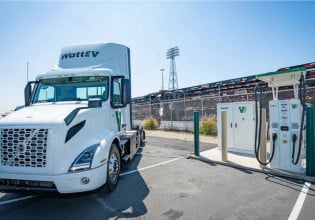AFS Trinity Pulls SUV Out Of LA Auto Show Due To Disallowal Of 150 MPG Claim
AFS Trinity Power Corp. announced that it pulled its 150 MPG plug-in hybrid SUV prototypes out of the LA Auto Show but will independently exhibit and demonstrate the vehicles on their own elsewhere in downtown LA during the show. AFS Trinity claims that its decision followed actions by the LA Auto Show to "muzzle" the company from highlighting the 150 miles per gallon fuel economy of its XH150 prototype vehicles.
"The suppression by the automakers of information about technologies such as this raises serious questions about the judgment, vision, intentions and capabilities of the leadership of these companies," said Edward W. Furia, Chairman and CEO of AFS Trinity. "Such conduct by the automakers, who are currently seeking tens of billions of taxpayer dollars, ostensibly to develop fuel efficient vehicle technologies, is evidence they are reluctant to embrace solutions they didn’t invent."
Furia explained that, when AFS Trinity sought exhibition space on the main floor of the LA Auto Show, the only space that show management offered was the Kentia Hall basement. According to the company, the LA Auto Show is "owned" by the Greater Los Angeles New Car Dealers Association, which, in turn, is closely associated with the major auto makers in Detroit. To address AFS Trinity’s concern that the Kentia Hall basement space was much less likely to attract visitors to the XH150 exhibit, show management offered the company a package of floor space in Kentia, advertising space in the auto show program and billboard space on the main floor of the convention center, suggesting that AFS Trinity could use the ad and billboard to attract visitors to the basement exhibit.
"There was just one hitch," Furia said. "Before we could proceed, the content of our ad and billboard had to be submitted to auto show management for approval. When we told them that the ad and billboard content would essentially be the same as what the company has used in its web site for the past ten months and which we used at the Detroit Auto Show in January, they responded that our mileage claim of 150 miles per gallon would not be permitted."
Furia quoted an email from LA Auto Show management that said, "We cannot approve this content . . . the mileage claim is of primary concern to us. Manufacturers are forced to quote EPA verified mpg numbers in their advertising, and . . . 150-MPG figure is an estimation. A banner like this one in the lobby is likely to generate unfavorable reactions from manufacturers, which is something we will take action to avoid." (Email from LA Auto Show Assistant General Manager, Scott Webb).
In response, AFS Trinity observed that EPA does not certify mileage estimates of show cars and prototypes, but nevertheless offered to modify its billboard and ad content with new text, stating, "150-MPG is an estimate, not EPA-certified . . .your mileage may vary."
The email AFS Trinity received in response from LA Auto Show management, according to Furia, read: ’We will not accept any billboard or program advertising that mentions AFS Trinity’s 150-MPG claim, including references as part of the graphics on the vehicle. This is no longer a topic for further discussion."
Explaining AFS Trinity’s decision to pull out of the LA Auto show completely, Furia said, "We had no choice but to pull out of the show when they refused to let us state our 150-MPG mileage estimate, as it is the most important and popular feature of our technology. Indeed, I believe our fuel economy would be the main reason that people would go to the trouble to find us at the auto show," he said. "Being in the basement was bad enough. Forcing us to be silent about our key benefit was simply unacceptable."
"The action that the LA Auto Show took to muzzle AFS Trinity has implications for such a bailout," Furia said. "The idea that the Detroit automakers, through their LA Auto Show agents, would seek to suppress interest in a super-efficient vehicle technology developed by a small company such as AFS Trinity truly challenges the imagination, particularly given the global energy security landscape through which America must navigate in the next several decades."






